Jujutsu Kaisen Modulo Chapter 7 fits perfectly for what might be the most dialogue-heavy, emotionally charged, and politically symbolic chapter of the spinoff so far.
While previous entries in the series leaned on spectacle and curse battles, Jujutsu Kaisen Modulo Chapter 7 slows down to explore the philosophical divide between humans and Sumerians.
Disclaimer: This article has spoilers from Jujutsu Kaisen Modulo Chapter 7. Reader's discretion is advised.
The Cursed speech returns: Usami’s mysterious heritage
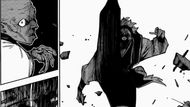
The chapter opens with an old curse user fleeing through the city streets, only to be stopped by Usami, who delivers the command “Don’t move!” The man mocks him, asking if he’s supposed to call him Sensei, but Usami calmly repeats the command, this time revealing snake and fang-like tattoos on his hand.
The phrase “Cursed Speech!” echoes through the page, confirming that Usami has either inherited or replicated the technique of the Inumaki Clan. This revelation is huge.
Whether Usami is a direct descendant or simply someone who learned the once-exclusive technique, the implication is clear: post-Culling Game Jujutsu society may have opened its gates, allowing cursed techniques to be studied and distributed more widely.
It’s a small but meaningful glimpse into how the world has evolved after the chaos of Sukuna and Gojo’s era. Usami quickly subdues the curse user and orders Mino to handle the arrest, marking the end of the opening skirmish. But it’s only the calm before a storm of ideological warfare.
Cross and humanity: “We refuse to be your neighbors”
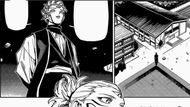
The narrative shifts to Cross, Maru, and Tsurugi, and immediately the tone darkens. Cross confronts Tsurugi about his earlier remark, calling the Sumerians “neighbors.” To Cross, the very idea is offensive and an insult to the suffering his people endured. His monologue is one of the chapter’s highlights.
Cross argues that humans have grown complacent, never needing to fight for survival. Their privilege, he says, has made them cruel, especially after the Kyoto Paranormal Resolution, which seemingly established Japan as a nationalist, isolationist power following the Culling Game.
Refugees and outsiders were demonized, and cursed energy became a symbol of racial superiority. By the time Cross finishes, it’s clear he sees Earthlings as hypocrites hiding behind morality.
When asked if Sumerians would coexist peacefully, he replies coldly. This exchange reframes the central conflict of Jujutsu Kaisen Modulo: not as humans versus aliens, but as a struggle between empathy and inherited prejudice.
Maru’s wounds and Cross’s deception
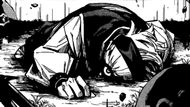
When Usami arrives, Cross requests permission to take his injured brother, Maru, back to the Sumerian mothership for treatment. Usami refuses, fearing that showing a wounded alien to their people could spark an intergalactic incident. He insists that human doctors will handle the situation.
Cross in Jujutsu Kaisen Modulo Chapter 7 reluctantly agrees, but in secret, he “borrows” Maru’s identity. Using his brother’s bandages and hairstyle, he disguises himself as Maru, likely to infiltrate the human ranks and learn their true motives. This deception sets up the major political tension of future chapters.
Meanwhile, a haunting panel interrupts the sequence, a dark figure resembling Mahito looming upside down over an unconscious man. Though not confirmed, the imagery implies that remnants of cursed spirits may still lurk in the “Cursed Realm,” watching and waiting for the right vessel.
Yuuka’s illness and the question of faith
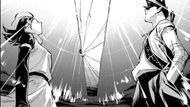
Later scenes in Jujutsu Kaisen Modulo Chapter 7 soften the tone as Tsurugi, Yuuka, and “Maru” (actually Cross) spend a quiet day together. They help a lost child at an amusement park, and Yuuka’s playful energy contrasts sharply with Cross’s coldness. Yet this lighthearted moment soon transitions into something far more tragic.
In Jujutsu Kaisen Modulo Chapter 7, Yuuka visits a hospital and confides that she’s suffering from a brain illness, possibly cancer, with only six months left to live. Her conversation with Cross turns philosophical and brutal.
He explains how despair robs people of joy, replacing laughter and love with resentment. Yuuka realizes this bitterness mirrors Cross’s own. Their exchange, about faith, humanity, and cruelty, becomes one of the most haunting in the series.
Yuuka wonders aloud about Japan’s past persecution of Christians, comparing it to stepping on an image of Christ to prove one’s loyalty. “Wouldn’t it be enough to just say sorry later?” she muses, a symbolic commentary on moral compromise.
Cross fires back that humans like her trampled on others’ lives without realizing it. His final words are chilling.
The declaration of war in Jujutsu Kaisen Modulo Chapter 7
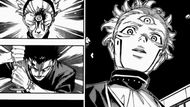
By the chapter’s end, Cross’s composure cracks. He erupts but Yuuka, however, refuses to let hatred win. In the closing page, she challenges him, and her plea for understanding, even while facing death, stands as the moral heart of Jujutsu Kaisen Modulo Chapter 7.
Final thoughts
Jujutsu Kaisen Modulo Chapter 7 trades combat for confrontation, philosophical, cultural, and emotional. Cross’s declaration of war, Yuuka’s mortality, and the reintroduction of cursed speech all intertwine to create a story about how empathy can both bridge and break worlds.
